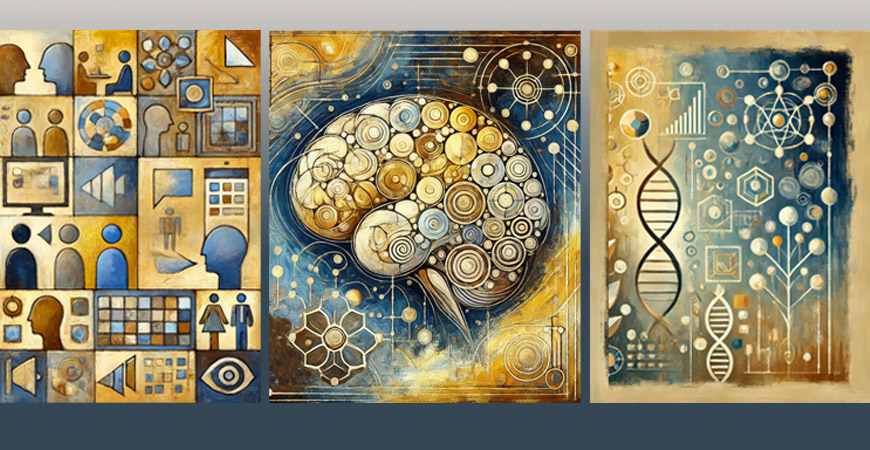
Information – how it is shaped, delivered and received – is a thread that runs through three dynamic new majors at UC Merced.
Communication and media; neuroscience; and science, technology and ethics will be available to undergraduate students in the fall semester 2025. The majors are centered in the School of Social Sciences, Humanities and Arts but tap into knowledge from the School of Natural Sciences and School of Engineering.
Here’s a rundown:
Communication and media (B.A.)
“We recognized this was something the students wanted,” Professor Jayson Beaster-Jones said of the of communication and media major, which takes advantage of the faculty talent in the Department of Global Arts, Media and Writing Studies.
“We have most of the pieces already available. The major allows us to combine our media and art studies with our writing programs to create a significant package that’s important to students and their future employers,” said Beaster-Jones, a professor of music and performance studies who had a lead role in developing the major.
The major immerses students in research and practices that form communication in diverse media. It leverages faculty expertise in cultural studies, film studies, performance studies, visual studies, sound studies, gender studies, rhetoric, writing studies, cognitive science and linguistics. Students also can use the university’s recording studio and audio-visual labs.
The lower-division communications and writing courses align with those taught throughout California’s two- and four-year institutions, making it ideal for transfer students. The upper-division courses branch into a rich menu of specialties, such as writing for natural sciences, engineering or psychology. There are courses in podcasting; rhetoric; photography; video production; media and race; and management communication.
“It’s worth emphasizing this is a UC degree program. We are bringing in researchers at the top of their fields. We will be teaching at a high level of excellence,” Beaster-Jones said. “We’re looking for students who are highly motivated and want to prepare for excellent careers.”
The wide range of careers attainable with the degree include content creator, marketing manager, journalist, animator, public relations specialist and editor.
Neuroscience (B.S. and B.A.)
Neuroscience is the study of the nervous system, which is like describing the Grand Canyon as an old riverbank. There’s so much more. Navigating a realm built on synapses, enzymes and (of course) neurons, students will learn how the body communicates with itself and analyzes the world around it.
At the micro level, neuroscience examines the brain’s structure and how chemical reactions trigger neural actions that contract muscles, regulate organs and maintain the body’s internal environment. At the macro level, the discipline studies how the brain encodes speech, written words, music and memory. As such, neuroscience crosses into psychology, health and cognitive science.
"More than any other subject matter, neuroscience is at the intersection of all sciences and arts,” said Professor Tony Shahin, a neuroscientist and physicist who heads UC Merced’s new Center for Interdisciplinary Neuroscience.
The neuroscience degree will have bachelor of science and bachelor of arts options. The B.S. track delves into neurobiology, psychology, cognitive science and biomedical engineering, along with broader subjects such as chemistry, physics and mathematics. It offers three emphases:
-
Molecular, Systems and Cellular
-
Computational, Perceptual, and Cognitive
-
Neuroscience of Human Health and Development
The bachelor of art option is similar to the B.S. but with less emphasis on physics and mathematics. UC Merced also will have a neuroscience minor that calls for two required courses and three electives.
Possible careers to spring from a neuroscience degree include natural sciences manager, clinical research coordinator, biological technician and data analyst. With further study and training, a graduate could be a medical or biological scientist, or a physician.
“A degree in neuroscience allows the student to tailor their career to fit their unique interest,” Shahin said. “As a long-time neuroscientist, I am thrilled to begin teaching the discipline to the wonderful undergraduate student population at UC Merced.”
Science, technology and ethics (B.S.)
In a time when advances in artificial intelligence, weather upheavals tied to climate change and the threat of viruses such as COVID-19 are in the headlines every day, the world needs people who understand the technical and humanistic sides of these life-changing issues.
The science, technology and ethics major combines studies in fields such as engineering, biology and applied mathematics with courses commonly associated with a philosophy major. This can equip a student with the knowledge to address questions such as:
-
How can communities and businesses prepare for how generative AI can take over jobs and responsibilities currently handled by people?
-
Can discussions about climate change, vaccines and animal-to-human diseases such as COVID be untangled from polarizing politics so science-driven knowledge can lead the way?
-
What are the core reasons why people might distrust genetically modified food? How do scientists and other experts address this distrust effectively?
“To really understand what’s at stake in a controversy, someone needs to understand both the technical details as well as the broader social context. Without the two, your perspective is incomplete,” UC Merced philosophy Professor Dan Hicks said.
The bachelor of science degree in science, technology and ethics calls for students to take at least three courses in a science, technology, engineering or math (STEM) field such as data science, biology or public health. The major integrates STEM instruction with social science and humanities coursework.
Possible career areas from this degree include information technology, human resources, public relations and project management. With further study and training, a graduate could be an intellectual property lawyer or a social science researcher.




 Public Information Officer
Public Information Officer

